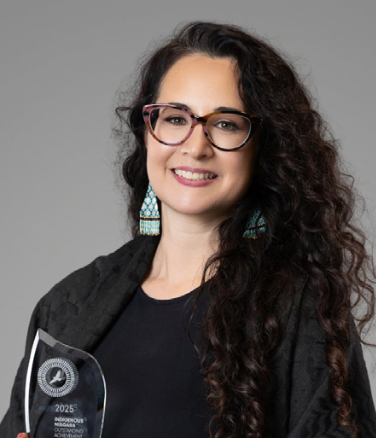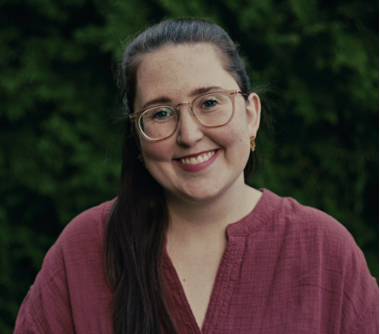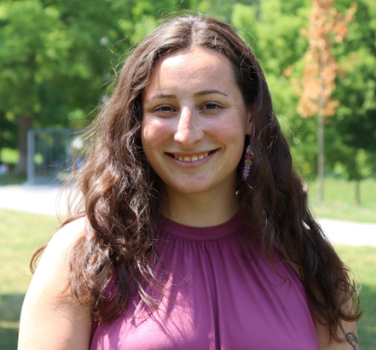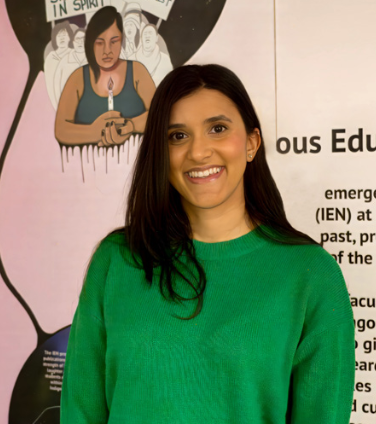An Indigenous Feminist Reading Praxis for Imagining Anticolonial Futurities: Honoring the Spirit and Intent of Katherena Vermette’s Writings
by Jennifer Brant, Erenna Morrison, Jasmine Rice, and Gayatri Thakor
As an Indigenous writer, I feel that the gift of writing and the privilege of writing holds a responsibility to be a witness to my people….so many come to me after and tell me that this is their story also. And so many Native people speak to me of their renewal, their choice to be a witness to our history. (Beth Brant, 1994, p. 70)
It was through Indigenous poetry…that I found a cadence and an approach and perspective that isn’t in European poetry….it was that moment of familiarity, that moment of light shining on something. I realized that I could write what I see. (Katherena Vermette, as cited in Hanson, 2020, p. 56)
The above words from Beth Brant’s Writing as Witness: Essay and Talk (1994) and Katherena Vermette’s interview with Métis scholar Aubrey Jean Hanson in Literatures, Communities, and Learning: Conversation with Indigenous Writers (2020) offer a glimpse into the sacredness of words, specifically of the words gleaned from Indigenous feminist literatures that give life to and gift us with visions for imagining anticolonial futurities. B. Brant’s (1994) words highlight the beauty and gift of Indigenous women’s writings, particularly from a time when Indigenous women’s literatures were difficult to find. As Lee Maracle (2019) wrote in A Generous Spirit: Selected Work by Beth Brant, “In those days, the few of us that were writing were so hungry for each other’s work” (p. 7). This hunger for Indigenous writing has inspired what B. Brant (1994) referred to as “flowering growth” (p. 9) for new generations of Indigenous writers—like Katherena Vermette, a Winnipeg-based, Métis author—who have come forward and transformed the literary landscape. As Vermette (2020) explained, writing what she saw was about showcasing the beauty of Indigenous womanhood. It is through this personal and embodied lens that Vermette powerfully writes narratives that align with the lived realities of Indigenous readers. Attending to an ethical and relational encounter with Indigenous literatures, we open with these sentiments about the resonance that can be found within Indigenous women’s literature to incite a reckoning and a renewal. Indeed, Indigenous literatures hold powerful aesthetic qualities that transform literary imaginations from the deficiency narratives about Indigenous peoples that are threaded throughout the White-dominated mainstream literary canon, into narratives of the power of Indigenous brilliance for imagining anticolonial futurities.
 Dr. Jennifer Brant belongs to the Kanien’kehá:ka (Mohawk Nation) with family ties to Six Nations of the Grand River Territory and Tyendinaga Mohawk Territory. Jennifer is the founding director of the Indigenous Literatures Lab and an associate professor in the Department of Curriculum, Teaching and Learning at the Ontario Institute for Studies in Education of the University of Toronto, where she teaches courses on Indigenous maternal praxis as well as Indigenous literatures and methodologies. Jennifer is co-editor of Forever Loved: Exposing the Hidden Crisis of Missing and Murdered Indigenous Women and Girls in Canada (2016) and Rematriating Justice: Honouring Our Missing Sisters (2024).
Dr. Jennifer Brant belongs to the Kanien’kehá:ka (Mohawk Nation) with family ties to Six Nations of the Grand River Territory and Tyendinaga Mohawk Territory. Jennifer is the founding director of the Indigenous Literatures Lab and an associate professor in the Department of Curriculum, Teaching and Learning at the Ontario Institute for Studies in Education of the University of Toronto, where she teaches courses on Indigenous maternal praxis as well as Indigenous literatures and methodologies. Jennifer is co-editor of Forever Loved: Exposing the Hidden Crisis of Missing and Murdered Indigenous Women and Girls in Canada (2016) and Rematriating Justice: Honouring Our Missing Sisters (2024).
 Erenna Morrison (she/her) is a Curriculum and Pedagogy doctoral candidate at the Ontario Institute for Studies in Education (OISE). Erenna has an undergraduate degree in Early Childhood Education and a master’s degree in Teaching. Her PhD research focuses on reconciliatory education, specifically concerning the elementary religion curriculum in Catholic schools. Erenna is also a member of the Indigenous Literatures Lab at OISE and works to support the developing “First Voices” research project.
Erenna Morrison (she/her) is a Curriculum and Pedagogy doctoral candidate at the Ontario Institute for Studies in Education (OISE). Erenna has an undergraduate degree in Early Childhood Education and a master’s degree in Teaching. Her PhD research focuses on reconciliatory education, specifically concerning the elementary religion curriculum in Catholic schools. Erenna is also a member of the Indigenous Literatures Lab at OISE and works to support the developing “First Voices” research project.
 Jasmine Rice is an emerging scholar at the Ontario Institute for Studies in Education (OISE) whose research focuses on Indigenous Language Reclamation and Cultural Identity. Her work is grounded in her experiences learning Kanien’kéha, the ancestral language of her family’s community, Kahnawà:ke. Jasmine is also a passionate educator with experience teaching at the high school and university levels. Her teaching areas include language learning, Indigenous studies, and education.
Jasmine Rice is an emerging scholar at the Ontario Institute for Studies in Education (OISE) whose research focuses on Indigenous Language Reclamation and Cultural Identity. Her work is grounded in her experiences learning Kanien’kéha, the ancestral language of her family’s community, Kahnawà:ke. Jasmine is also a passionate educator with experience teaching at the high school and university levels. Her teaching areas include language learning, Indigenous studies, and education.
 Gayatri Thakor is a doctoral student in Curriculum, Teaching and Learning at the University of Toronto. Her research interests include anti-colonialism in education, Indigenous education, and Black, Indigenous, and decolonial feminisms. Her current research explores how Indigenous pedagogies and an anti-colonial praxis of spirituality can support Black, Indigenous, and racialized teacher candidates to foster communities of healing from spirit injuries inflicted through experiences within formal education systems. This space serves to disrupt the ongoing hegemony of Whiteness and modernity in education. Gayatri is interested in creating critical spaces of learning, centered in interconnectedness, joy, accountability, and radical love.
Gayatri Thakor is a doctoral student in Curriculum, Teaching and Learning at the University of Toronto. Her research interests include anti-colonialism in education, Indigenous education, and Black, Indigenous, and decolonial feminisms. Her current research explores how Indigenous pedagogies and an anti-colonial praxis of spirituality can support Black, Indigenous, and racialized teacher candidates to foster communities of healing from spirit injuries inflicted through experiences within formal education systems. This space serves to disrupt the ongoing hegemony of Whiteness and modernity in education. Gayatri is interested in creating critical spaces of learning, centered in interconnectedness, joy, accountability, and radical love.